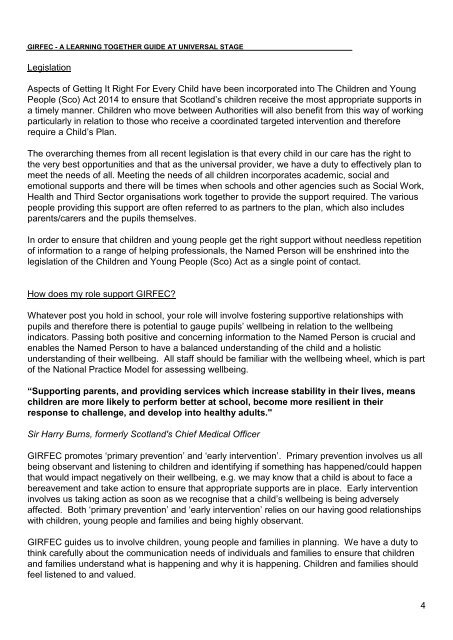Learning Together GIRFEC Getting It Right For Every Child
Learning-Together-Guide-GIRFEC
Learning-Together-Guide-GIRFEC
Create successful ePaper yourself
Turn your PDF publications into a flip-book with our unique Google optimized e-Paper software.
<strong>GIRFEC</strong> - A LEARNING TOGETHER GUIDE AT UNIVERSAL STAGE<br />
Legislation<br />
Aspects of <strong>Getting</strong> <strong>It</strong> <strong>Right</strong> <strong>For</strong> <strong>Every</strong> <strong>Child</strong> have been incorporated into The <strong>Child</strong>ren and Young<br />
People (Sco) Act 2014 to ensure that Scotland’s children receive the most appropriate supports in<br />
a timely manner. <strong>Child</strong>ren who move between Authorities will also benefit from this way of working<br />
particularly in relation to those who receive a coordinated targeted intervention and therefore<br />
require a <strong>Child</strong>’s Plan.<br />
The overarching themes from all recent legislation is that every child in our care has the right to<br />
the very best opportunities and that as the universal provider, we have a duty to effectively plan to<br />
meet the needs of all. Meeting the needs of all children incorporates academic, social and<br />
emotional supports and there will be times when schools and other agencies such as Social Work,<br />
Health and Third Sector organisations work together to provide the support required. The various<br />
people providing this support are often referred to as partners to the plan, which also includes<br />
parents/carers and the pupils themselves.<br />
In order to ensure that children and young people get the right support without needless repetition<br />
of information to a range of helping professionals, the Named Person will be enshrined into the<br />
legislation of the <strong>Child</strong>ren and Young People (Sco) Act as a single point of contact.<br />
How does my role support <strong>GIRFEC</strong>?<br />
Whatever post you hold in school, your role will involve fostering supportive relationships with<br />
pupils and therefore there is potential to gauge pupils’ wellbeing in relation to the wellbeing<br />
indicators. Passing both positive and concerning information to the Named Person is crucial and<br />
enables the Named Person to have a balanced understanding of the child and a holistic<br />
understanding of their wellbeing. All staff should be familiar with the wellbeing wheel, which is part<br />
of the National Practice Model for assessing wellbeing.<br />
“Supporting parents, and providing services which increase stability in their lives, means<br />
children are more likely to perform better at school, become more resilient in their<br />
response to challenge, and develop into healthy adults."<br />
Sir Harry Burns, formerly Scotland's Chief Medical Officer<br />
<strong>GIRFEC</strong> promotes ‘primary prevention’ and ‘early intervention’. Primary prevention involves us all<br />
being observant and listening to children and identifying if something has happened/could happen<br />
that would impact negatively on their wellbeing, e.g. we may know that a child is about to face a<br />
bereavement and take action to ensure that appropriate supports are in place. Early intervention<br />
involves us taking action as soon as we recognise that a child’s wellbeing is being adversely<br />
affected. Both ‘primary prevention’ and ‘early intervention’ relies on our having good relationships<br />
with children, young people and families and being highly observant.<br />
<strong>GIRFEC</strong> guides us to involve children, young people and families in planning. We have a duty to<br />
think carefully about the communication needs of individuals and families to ensure that children<br />
and families understand what is happening and why it is happening. <strong>Child</strong>ren and families should<br />
feel listened to and valued.<br />
4


